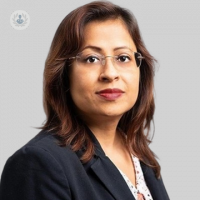What you should know about lichen sclerosus and how it affects the vulva
Written by:Lichen sclerosus is one of the most common conditions that can affect the vulva. It’s easy to confuse with other conditions because it shares many of the same symptoms. However, left untreated, it can progress to scarring and in rare cases can even progress to skin cancer. We spoke to leading consultant dermatologist Dr Moumita Chattopadhyay to find out how patients can spot the condition and how it is treated.

What is lichen sclerosus?
Lichen sclerosus is an autoimmune disease, meaning it results from your body’s immune system not working properly and mistakenly attacking healthy cells. It is often associated with other autoimmune disorders, especially thyroid disease.
Lichen sclerosus mainly affects older, post-menopausal women, but it is possible to develop the disease at a young age.
What are the main symptoms?
The main symptoms of lichen sclerosus are itching in the vulva, as well as soreness and pain during intercourse. However, sometimes it is possible to develop lichen sclerosus without any symptoms at all.
In addition to the above symptoms, lichen sclerosus causes discolouration of the skin. You may notice white patches or patches of smoother and shinier skin. The areas most commonly affected include the clitoris, labia minora, interlabial sulci and perineum, often extending backwards to involve the skin around the anus. In most cases, lichen sclerosus is restricted to the anogenital area, but some people can get patches of white, shiny skin on the back, abdomen or thighs.
Over time, other skin changes can occur, including bruising, prominent blood vessels, thickening, fissuring and ulcers. If the vaginal opening is affected, this can make intercourse painful. Damage to the skin eventually causes scarring with its consequences. It’s therefore important to see a doctor early on if you notice any of the signs above.
How is lichen sclerosus treated?
The main form of treatment for lichen sclerosus is to apply strong steroidal cream to the area affected. This works by reducing inflammation in the skin.
After a month of daily use, it is usually possible to reduce the frequency of application. But since the inflammation is chronic, long-term treatment may be needed. Many women can maintain control over their condition by applying cream or ointment just once or twice a week.
Most of the time, surgery is not required for lichen sclerosus and in fact discouraged because it can induce spread of the disease. Surgery would only be considered if lichen sclerosus develops into squamous cell carcinoma (SCC) and if pre-cancer is suspected. Vulval SCC is rare and occurs in 5% of cases of lichen sclerosus.
Dr Chattopadhyay provides evidence-based expert advice on all aspects of general adult and paediatric dermatology. To book a consultation with Dr Chattopadhyay, click here.


